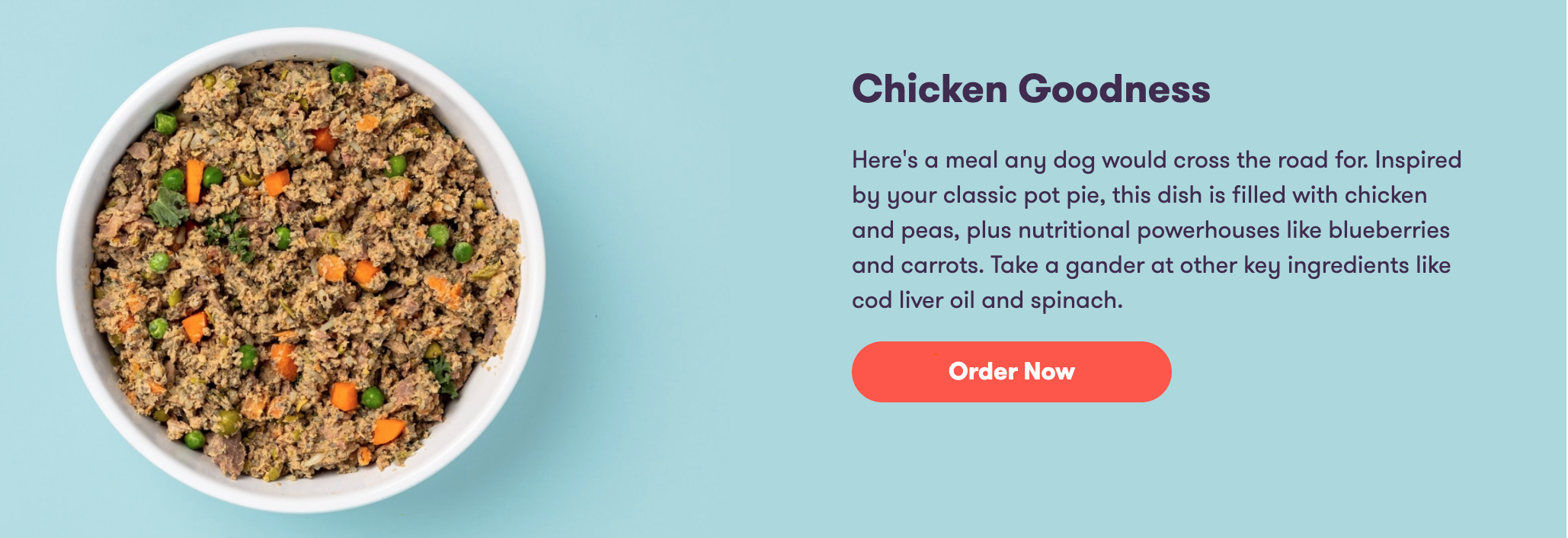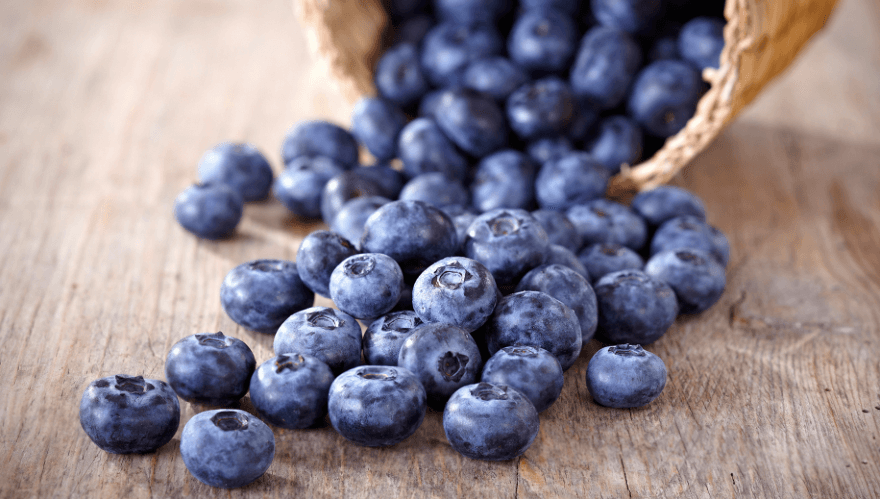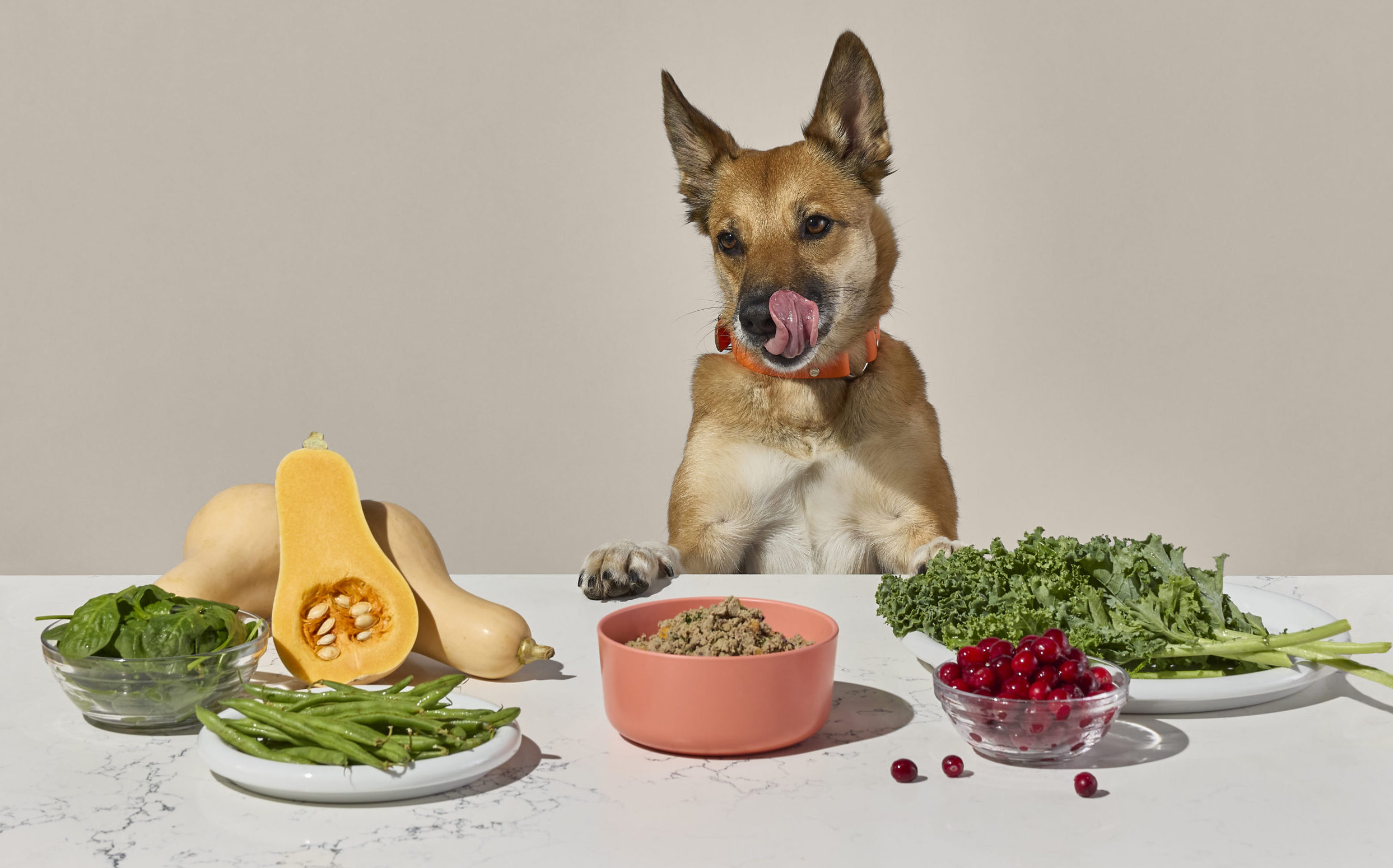Hey Ollie blog readers! We’re offering you an exclusive 60% OFF your starter box! Try now!
If your dog loves to gobble up blueberries when they roll on the floor, you might be wondering: Can dogs eat blueberries and are blueberries good for dogs? The answer is most definitely! This summer fruit can have a huge positive impact on your dog’s health. Those midnight blue little orbs are jam-packed with canine nutrition. Perfectly-sized to serve as a training treat (try them frozen!) or as a superfood sprinkled in the dog bowl, this fruit is a great addition to a balanced diet for your dog.

Can Dogs Eat Blueberries?
Yes, dogs can eat blueberries! These small, nutrient-dense berries are not only safe for dogs but also provide a variety of health benefits. Blueberries are packed with antioxidants, vitamins C and K, and fiber, all of which contribute to your dog’s overall well-being.
One of the biggest advantages of blueberries is their high antioxidant content, which helps fight free radicals and supports immune health. The natural fiber in blueberries also aids digestion, making them a great low-calorie treat. Additionally, their small size and soft texture make them an easy snack for dogs of all sizes, even those with dental sensitivities.
While blueberries are safe, moderation is key. Feeding too many at once could cause digestive upset. It’s best to introduce them gradually and offer them as a treat rather than a meal replacement. Always wash blueberries thoroughly before serving and avoid any that have been sweetened or processed with added sugars.
By adding blueberries to your dog’s diet in a controlled way, you can provide a tasty, nutritious boost that supports their health and happiness!
Why Are Blueberries Good for Dogs?
Blueberries are packed with vitamins and minerals that make them a healthy choice for dogs. They contain a class of compounds known as flavonoids, a group of nutrients that have antioxidant and anti-inflammatory properties. These flavonoids give blueberries that deep, vibrant color and also make them good for dogs.
Blueberries are Good for Dogs’ Cardiovascular Health
Antioxidants in blueberries are beneficial to your dog’s heart health. They work to protect against free radicals that cause cell damage and are particularly beneficial for red blood cells that transport oxygen from the lungs throughout the body. They may help prevent cardiovascular disease and keep a dog’s ticker going strong.
Blueberries Help Dogs Stay Agile
The anti-inflammation properties in blueberries intercept signals that tell cells to get inflamed by inhibiting specific enzymes (cyclooxygenase and lipoxygenase). The result? Dogs are potentially less likely to have inflammation which would cause pain and swelling in their joints. All that healthy cell activity leads to better agility in dogs, especially as they age, because cells (and therefore bones, joints and muscles) have been protected from harsh wear and tear over the years.
They Ward Against Cancer in Dogs
Multiple studies—in humans and dogs—show a link between blueberries and the prevention of certain types of cancer, including colon, bladder, and small intestine. One study, published in Pathology & Oncology Research concluded that blueberries “exhibit inherent abilities to prevent carcinogenesis, inhibit the proliferation of neoplastic cells, and reduce the risks of recurrence in patients in remission.” This (Three cheers for cancer prevention!)
Blueberries Improve Dogs’ Memories
A recent study found that when dogs were given higher amounts of anthocyanins (one of blueberries’ flavonoids), they exhibited improved memory skills, especially as they aged. So while your dog may not be ready to do your taxes yet, he might finally master that trick where he brings you the remote control. Reward him with a blueberry of course!
Blueberries for Dogs Prevent UTIs
And just when you thought it couldn’t get any better, new research suggests that blueberries also help prevent against UTIs (urinary tract infections), which are common in dogs and uber painful. The fruit contains a compound that prevents bacteria from attaching to the bladder wall and tissues of the urinary tract.
What’s the Best Way for Dogs to Eat Blueberries?
Dogs can eat blueberries raw or frozen, mixed in food or as a snack. All of these benefits are why Ollie uses blueberries in many of its balanced recipes.
The only reason a dog couldn’t (or shouldn’t) eat blueberries is if the berries were mixed with any sugar or spices. Never give your dog blueberry jam as that may contain xylitol, which is a toxin for dogs.
The Ollie blog is devoted to helping pet parents lead healthier lives with their pups. If you want to learn more about our fresh, human-grade food, check out MyOllie.com.
Frequently Asked Questions About Blueberries
Can dogs have blueberries every day?
Yes, dogs can have blueberries daily in moderation. These nutrient-packed berries provide antioxidants, vitamins, and fiber, but too many may cause digestive upset. Treat blueberries as an occasional snack rather than a primary food source.
Are blueberries good for dogs with sensitive stomachs?
Blueberries are generally easy to digest, but dogs with sensitive stomachs should start with small amounts. If your pup experiences any digestive issues, such as diarrhea or gas, reduce the portion size or consult your veterinarian.
Are blueberries safe for all dogs?
Yes, blueberries are safe for most dogs. However, if your dog has underlying health conditions like diabetes, it’s best to consult your vet before adding them to their diet. Also, always serve fresh or frozen blueberries—avoid those with added sugars or artificial ingredients.
Can puppies eat blueberries?
Yes, puppies can eat blueberries, but in small amounts. Since puppies have more sensitive digestive systems, start with a few berries and monitor for any adverse reactions.
How many blueberries can I give my dog?
Portion size depends on your dog’s weight. Small dogs can have 2–3 blueberries, while larger breeds may enjoy a small handful. Always introduce new foods gradually and observe your dog’s reaction.
Can blueberries help with my dog’s eyesight?
Yes! Blueberries contain antioxidants that support eye health and may help slow age-related vision decline in dogs. These compounds help protect cells from damage and promote overall well-being.
Are frozen blueberries good for dogs?
Yes, frozen blueberries are a great treat, especially on hot days. They retain the same nutrients as fresh blueberries and can provide a refreshing, crunchy snack for your pup.
Tagged As:

The nutrition your dog needs,
the food they want.

Enjoying our articles? Subscribe our Newsletters and get new articles directly to your inbox
You might also like
21 July 2025
6 MINS READ
Can Dogs Eat Nuts? Which Nuts Are Safe & Serving Guide
Can dogs have nuts? Some nuts are fine in moderation, but others can cause serious harm. This quick guide breaks down which nuts are safe for dogs, which to skip, and how to feed nut butters respon…
18 July 2025
4 MINS READ
New Puppy Diet Recommendations for Healthy, Happy Growth
As a new pup parent, one of the biggest ways you can support your puppy’s long-term health is by providing the right nutrition. A puppy’s dietary needs are different from an adult dog’s, and…
by Ollie Pets
18 July 2025
5 MINS READ
How Human-Grade Dog Food Benefits Your Pup’s Health and Happiness
You’ve likely heard the term “human-grade” dog food, but what does it really mean, and is it worth it? Choosing human-grade food can be a significant investment for your dog’s long-term he…
by Ollie Pets







